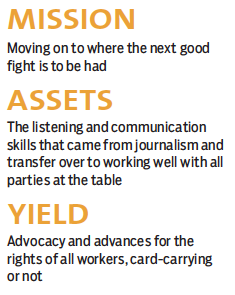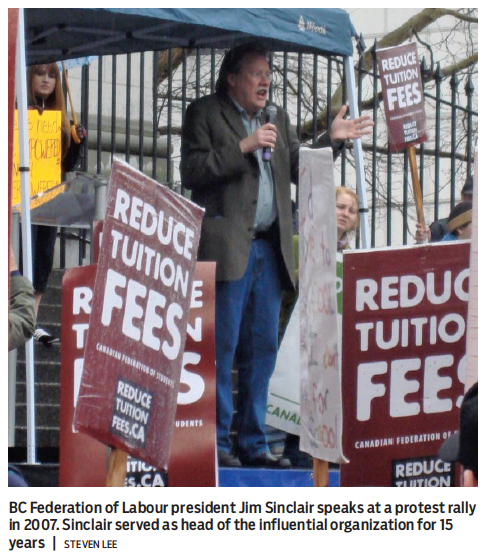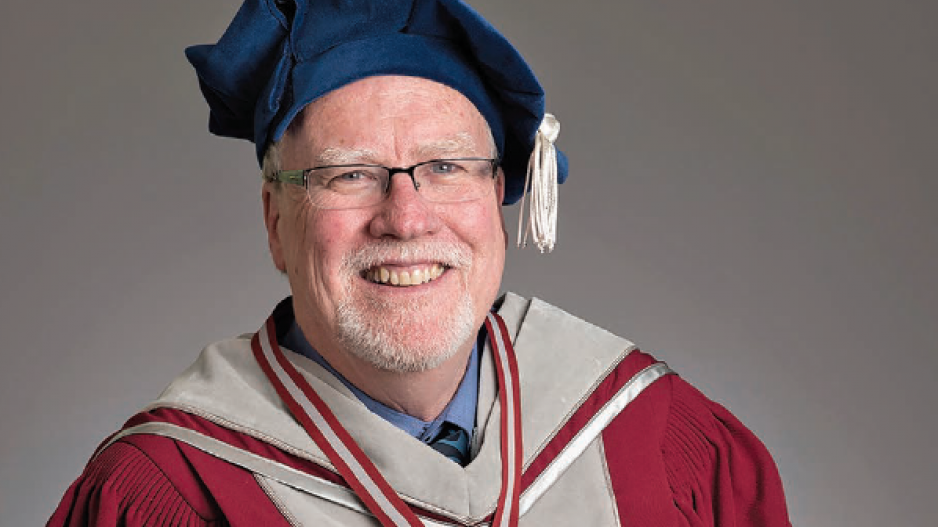One day, back when reporters used typewriters and layout was laboured over by hand in a back shop, Jim Sinclair walked into the Nelson Daily News from off of the street and got a job straight away.
It was around the beginning of the digital revolution, when big computers with tiny screens were starting to make an appearance, Sinclair remembered. It was also just a few years after he walked his first picket line at 17, supporting a strike in Brantford, Ontario.
“I didn’t even have a degree,” said Sinclair, who added that at the time, one wasn’t necessarily needed. Like many, he instead chose to cut his skills out in the world, starting in the Kootenays, with jobs in journalism leading to jobs at union papers and further involvement in progressive politics.
When his reporting days ended (the revolutionary machines did replace some of the writers, although his reasons for leaving were typically political) Sinclair threw all of his belongings into the back of a pickup truck and headed for the coast.
“Ten years later I ran for president of the [BC] Federation of Labour,” (BC Fed) said Sinclair, who served the province’s workers at the helm of that organization for a decade and a half up until his retirement last fall.

Sinclair’s legacy at the federation is hallmarked by his activism and championship of rights for all workers, whether they’re card-carrying union members or not. It’s this movement, and the work BC Fed accomplished under Sinclair’s stewardship, that he says are the true recipients of the honorary degree awarded to him by Kwantlen Polytechnic University (KPU) last month.
“The truth is I never thought I would be standing in front of you wearing a gown like this,” he joked to a few hundred parents, students and guests as he received his first and only post-secondary degree alongside KPU students graduating from the university’s faculties of health and academic and career advancement.
“It is unfortunate that my mother and my father are both gone because they would have relished a moment like this,” he added. “Like working-class mothers and fathers of the Depression generation, they knew their dreams for a better and prosperous life for their children would never be realized without their children getting a good education.”
Sinclair was both surprised and touched by his nomination for the degree, which, fittingly, was a collaboration among “workers” across KPU departments. The initial nomination came from university president and vice-chancellor Alan Davis and the two unions that represent KPU workers – the BC Government and Service Employees’ Union and the Kwantlen Faculty Association. The award was ultimately approved by the university senate, comprising chancellor George Melville, deans, faculty, support staff and alumni.
“One of Jim Sinclair’s many strengths is his ability to bring light and focus to the challenges faced by the often marginalized in society,” Davis said. “He’s so effective at it that those challenges become everyone’s challenges, and accordingly there is motivation to address them.”
Davis also noted that Sinclair’s work on behalf of all working people, and not just card-carrying workers, exemplifies the qualities of social and ethical awareness KPU values in its students.
While it’s Sinclair’s first degree, his KPU honour might not be his last post-secondary-related achievement.

While technically retired at the young age of 61 after his unprecedented 15-year term at the BC Fed, Sinclair says he will continue to go wherever there is a good fight to be had, and that “retirement” is out of the question.
“If you take the next 50 years in this country, the No. 1 issue is education. The world is going to require more and more educated people to operate and to run it. And the only way to participate is to have that education,” he said. “I say that if journalism and a free press is the oxygen of democracy, then education is the lungs. Because you can’t participate in the oxygen, if you don’t have the lungs. And education means intelligent people ask questions, participating in democracy.”
Sinclair currently has several projects and passions on the go, including the development of trades and apprenticeship programming that’s geared toward the liquefied natural gas industry, and helping to compile, with the BC Labour Heritage Centre Society, BC Fed and Simon Fraser University, a history of B.C. workers.
Re-entering journalism, or heading to the classroom for a university education, are options he’s keeping open for the future.
“I don’t know what I want to be when I grow up, so I’ve got to figure that out,” he said, admitting that there are many “good fights” to be had, and that he’s still searching for his next great challenge.
“You retire from jobs; you don’t retire from your heart. My heart will always be trying to make the world a better place. For whatever reason, that’s who I became, and I’m proud of it,” said Sinclair, who added he is also very proud of his honorary degree.
“It’s not really in honour of me per se; it’s in honour of the labour movement. Because I’m just a product of that. Anything I did was really because the labour movement allowed me to do it,” he said. “And it’s nice the university would acknowledge a labour leader, you know, as part of that. Because that doesn’t happen very often, boy.” •




